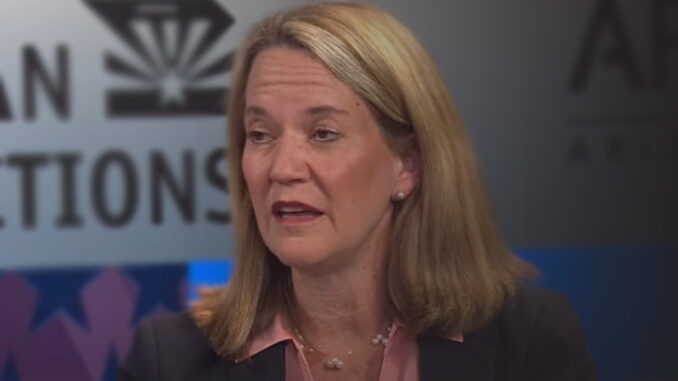
A Republican lawmaker is vowing to investigate Arizona Attorney General Kris Mayes’ decision to join a coalition of progressive attorneys general who support government censorship on social media platforms. The coalition is opposing a decision from a federal court judge prohibiting dozens of federal officials and agencies from working with and through social media companies to censor what the government claims is “harmful online content.”
“Labeling speech dangerous and calling for it to be suppressed is the first act of tyrants. Rest assured the House will be taking a very close look at this!” tweeted Arizona State Rep. Alexander Kolodin.
“I believe there is broad support for an investigation into the roles Arizona officials have played in the past to censor the views of Arizona citizens, and I expect soon we will be able to announce additional measures we will take in that regard,” Kolodin told the Arizona Daily Independent.
Federal Judge Terry Doughty of the U.S. District Court for the Western District of Louisiana blocked the Biden Administration from colluding with Big Tech companies to censor Americans’ protected speech. In his decision on Louisiana and Missouri v. Biden et al., Doughty prohibited key Biden officials from pressuring or conspiring with social media companies to suppress any content containing protected free speech on their platforms.
“The right to free speech is not a member of any political party and does not hold any political ideology. It is the purpose of the Free Speech Clause of the First Amendment to preserve an uninhibited marketplace of ideas in which truth will ultimately prevail, rather than to countenance monopolization of the market, whether it be by government itself or private licensee,” wrote Judge Doughty.
Mayes joins the attorneys general of California, Colorado, Connecticut, Delaware, Hawaii, Illinois, Maine, Massachusetts, Michigan, Minnesota, Nevada, New Jersey, New Mexico, New York, Oregon, Pennsylvania, Rhode Island, Vermont, Wisconsin, and the District of Columbia in filing the amicus brief.
“Social media companies and government officials must have open communication in order to ensure the safety of Americans online,” said Mayes in a press release. “A pillar of the U.S. government is to ensure the safety and wellbeing of its citizens. The lower court’s decision impedes on this protection and means federal, state and local officials cannot contact social media companies about dangerous online content.”
The Court’s Order blocks the Department of Health and Human Services, the National Institute of Allergy and Infectious Diseases, the Centers for Disease Control and Prevention, the United States Census Bureau, the Federal Bureau of Investigation, the United States Department of Justice, members of the Executive Office of the President of the United States – including the White House Press Secretary, the Cybersecurity and Infrastructure Security Agency, the United States Department of Homeland Security, and the United States Department of State.
